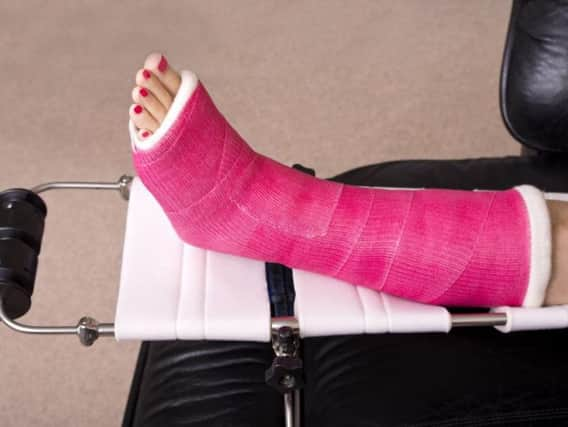Calcium and Vitamin D supplements do not protect against fractures


Around two fifths of all women over 50 will suffer a major fractures caused by brittle bones during the remainder of their lifetimes with hip fractures the most serious.
Previous studies have suggested a fifth of those will die within a year and survivors may need greater care which impacts on public finances.
Advertisement
Hide AdAdvertisement
Hide AdOlder people in care homes are at greatest risk of fractures.
Guidelines recommend giving calcium and vitamin D supplements for older people with osteoporosis to prevent fractures.
Osteoporosis weakens bones, making them fragile and more likely to break and the condition develops slowly over several years and often only diagnosed when a minor fall or sudden impact causes a bone fracture.
The most common injuries are wrist fractures. hip fractures and fractures of the spinal bones (vertebrae).
Advertisement
Hide AdAdvertisement
Hide AdIt affects over three million Britons and more than 500,000 receive hospital treatment for fragility fractures every year as a result of osteoporosis.
The NHS recommend those who are at risk should take regular exercise, eat a healthy diet rich in calcium and vitamin D, take Vitamin D supplements and stop smoking and drinking.
Yet previous studies produced inconsistent results on the benefits of supplements in reducing fractures, particularly among those not in care homes.
So Associate Professor Dr Jia-Guo Zhao in the Department of Orthopaedic Surgery
Advertisement
Hide AdAdvertisement
Hide Adat Tianjin Hospital, China, carried out a meta-analyses of 33 randomised clinical trials over the past 10 years including 14 from the UK.
Other trials were carried out in the US, Canada, Australia, New Zealand, Finland, Sweden, The Netherlands, Belgium and China.
These involved 51,145 adults over 50 living at home.
It found the use of supplements that included calcium, vitamin D, or both was not associated with a significant difference in the risk of hip fractures compared with placebo or no treatment (risk ratio, 1.53, 1.21, and 1.09, respectively).
It also concluded supplements were not associated with less risk for new fractures, regardless of the dose, the sex of the patient, their fracture history, calcium intake in their diet or baseline vitamin D blood concentrations.
Advertisement
Hide AdAdvertisement
Hide AdProf Zhao said: "Results of this meta-analysis showed that calcium, calcium plus
vitamin D, and vitamin D supplementation alone were not significantly associated with a lower incidence of hip, nonvertebral, vertebral, or total fractures in community-dwelling older adults
"A previous trial reported that calcium and vitamin D supplements lowered fracture risk for individuals living in residential institutions.
"These populations are more likely to have osteoporosis because of their poorer
mobility, infrequent sun exposure, and poorer diet.
Advertisement
Hide AdAdvertisement
Hide Ad"For these reasons it is possible that older people living in residential care communities may benefit from calcium or vitamin D supplements.
"In summary, benefits of calcium and vitamin D supplementation may differ between people living in the community and people living in residential institutions.
"In this meta-analysis of randomised clinical trials, the use of supplements that included calcium, vitamin D, or both compared with placebo or no treatment was not associated with a lower risk of fractures among community-dwelling older
adults.
"These findings do not support the routine use of these supplements in community-dwelling older people."
The study was published in JAMA.